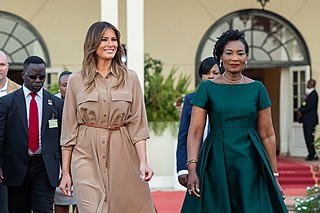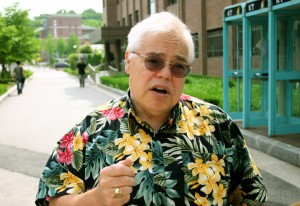
The Los Angeles LGBT Center is a provider of programs and services for lesbian, gay, bisexual and transgender people. The organization's work spans four categories, including health, social services, housing, and leadership and advocacy. The center is the largest facility in the world providing services to LGBT people.
Dance4life is an international youth initiative to raise awareness and promote prevention of HIV/AIDS.
Comprehensive sexuality education (CSE) is a sex education instruction method based on a curriculum that aims to give students the knowledge, attitudes, skills, and values to make appropriate and healthy choices in their sexual lives. The intention is that this understanding will prevent students from contracting sexually transmitted infections, such as HIV and HPV. CSE is also designed with the intention of reducing unplanned and unwanted pregnancies, as well as lowering rates of domestic and sexual violence, thus contributing to a healthier society, both physically and mentally.
Philadelphia FIGHT (FIGHT) is a Philadelphia AIDS service organization that provides primary care, consumer education, advocacy and research. FIGHT was formed as a partnership of individuals living with HIV & AIDS and clinicians.
Cheryl Ann Spector was a well-known gay, lesbian, bisexual and transgender activist who lived in Arlington, Virginia.

Whitman-Walker Health (WWH), formerly Whitman-Walker Clinic, is a non-profit community health center in the Washington, D.C. metropolitan area with a special expertise in HIV/AIDS healthcare and LGBT healthcare. Chartered as an affirming health center for the gay and lesbian community in 1978, Whitman-Walker was one of the first responders to the HIV/AIDS epidemic in D.C. and became a leader in HIV/AIDS education, prevention, diagnosis and treatment. In recent years, Whitman-Walker has expanded its services to include primary healthcare services, a stronger focus on queer women's care and youth services.

The United States established diplomatic relations with Malawi in 1964 after Malawi gained independence from the United Kingdom. Malawi's transition from a one-party state to a multi-party democracy significantly strengthened the already cordial U.S. relationship with Malawi. Significant numbers of Malawians study in the United States. The United States has an active Peace Corps program, Centers for Disease Control and Prevention, Department of Health and Human Services, and an Agency for International Development (USAID) mission in Malawi. Both countries have a common history and English language, as they were part of the British Empire.
NMAC, formerly known as the National Minority AIDS Council, works for health equity and racial justice to end the HIV epidemic in America. The nonprofit organization, located in Washington, D.C. was founded in 1987. NMAC represents over 3,000 community and faith-based organizations across the US. The agency advances its mission by providing minority and minority-serving faith and community based organizations with capacity building assistance programs, online and classroom-based trainings, printed and electronic resources, grassroots organization and political advocacy. These activities improve the delivery of HIV/AIDS services, helping to mitigate the impact of HIV/AIDS in underserved and marginalized communities.
Population Action International (PAI) is an international, non-governmental organization that uses research and advocacy to improve global access to family planning and reproductive health care. Its mission is to "ensure that every person has the right and access to sexual and reproductive health, so that humanity and the natural environment can exist in balance with fewer people living in poverty". PAI's headquarters is in Washington, D.C.

Like other countries worldwide, HIV/AIDS is present in Ghana. As of 2014, an estimated 150,000 people infected with the virus. HIV prevalence is at 1.37 percent in 2014 and is highest in the Eastern Region of Ghana and lowest in the northern regions of the country. In response to the epidemic, the government has established the Ghana AIDS Commission which coordinates efforts amongst NGO's, international organizations and other parties to support the education about and treatment of aids throughout Ghana and alleviating HIV/AIDS issues in Ghana.

HIV/AIDS in Lesotho constitutes a very serious threat to Basotho and to Lesotho's economic development. Since its initial detection in 1986, HIV/AIDS has spread at alarming rates in Lesotho. In 2000, King Letsie III declared HIV/AIDS a natural disaster. According to the Joint United Nations Programme on HIV/AIDS (UNAIDS) in 2016, Lesotho's adult prevalence rate of 25% is the second highest in the world, following Eswatini.
Cases of HIV/AIDS in Peru are considered to have reached the level of a concentrated epidemic.

Douglas Bernard Kirby was senior research scientist for ETR Associates in Scotts Valley, California, and one of the world’s leading experts on the effectiveness of school and community programs in the reduction of adolescent sexual risk-taking behaviors. In recent years he had also undertaken research and analysis on the impact of HIV/AIDS prevention programs in Uganda under the auspices of the World Health Organization, USAID, and other organizations.
The Population and Community Development Association (PDA) is a non-governmental organization in Thailand. Its goal is to reduce poverty through both development initiatives and family planning programs. Originally called the Community-Based Family Planning Service, it was founded by Mechai Viravaidya in 1974. In the early 1970s, Viravaidya was the Minister of Industry but became frustrated with the government's inability to implement a national family planning policy. In his work with the government, he identified a direct correlation between Thailand's poverty and population growth. His immediate concern was the high population growth rate of 3.2%, which equated to approximately seven children per family. The population growth rate was an increasing concern for Thailand and Mechai Viravaidya because high growth rates restricted Thailand's ability to provide for its entire population and improve living conditions. By 2011, Thailand's population growth rate was only 0.566%. A sharp reduction in poverty has followed upon the reduction in family size, a reduction which can in significant part be attributed to the influence and programs of the PDA.
Stephen Chibuikem Chukwumah is a Nigerian born Advocate and Strategist with extensive background in Youth Leadership and Advocacy, Policy, Movement Building, and Fund Raising. He is a public speaker and a former fellow of the faculty of Law, University of York, England. Stephen Chukwumah had a five year career as a Lead Division Coordinator at the International Monetary Fund in Washington D.C and is currently a Policy Advocate at the Council for Global Equality. He is from Ebenebe in Awka North LGA, Anambra state, Nigeria.

John Chittick was a youth HIV/AIDS specialist known for his series of Global AIDS Walks to fight the spread of HIV by educating youth. He worked in over 85 countries providing outreach to young people at the grassroots level.
Jean J. Schensul is a medical anthropologist and senior scientist at The Institute for Community Research, in Hartford, Connecticut. Dr. Schensul is most notable for her research on HIV/AIDS prevention and other health-related research in the United States, as well as her extensive writing on ethnographic research methods. She has made notable contributions to the field of applied anthropology, with her work on structural interventions to health disparities leading to the development of new organizations, community research partnerships, and community/university associations. Schensul’s work has been dedicated to community-based research on topics such as senior health, education, and substance abuse, among others.

Ruby Corado is an activist who founded Casa Ruby, a bilingual, multicultural LGBT organization in Washington, D.C. Established in 2012, Casa Ruby identifies its mission as "to create success life stories among Transgender, Genderqueer, and Gender Non-conforming Gay, Lesbian and Bisexual people." In July 2022, Corado was accused of mismanagement of Casa Ruby, which forced the organization to cease operations.

Youth in the Dominican Republic constitutes just over 30% of the total population. The Dominican Republic's population at roughly eleven million people has grown tremendously with the help of the youth population. In 1960, the youth population was at 3.3 million, and by 2008, it had reached 9.5 million, with two thirds of them in urban areas of the country.
Reach A Hand, Uganda (RAHU) is a youth serving nonprofit organisation based in Uganda that focuses on youth empowerment programs with an emphasis on, Sexual Reproductive Health Rights (SRHR) of young people between the ages of 12–24 years including HIV/AIDS awareness and prevention. RAHU works with the goal of increasing access to information and services relating to SRHR for young people so as to empower them live healthy, focused and productive lives. Reach A Hand Uganda efforts are timely to make a contribution to ensuring that every young person in Uganda can access accurate information to aid and direct them in taking that crucial life decision regarding their life skills and development, behavior change communication and sexual reproductive health and rights.









